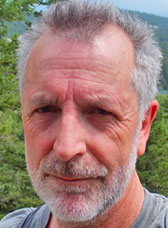Michael Watts’s foundational research on political ecology, vulnerability and resilience, agrarian political economy, the social production of famine, oil and development, and environmental justice continues to shape scholarly debates and research programs across the environmental social sciences, area studies, and humanities. Professor Watts is the Class of 1963 Professor of Geography and Development Studies at UC-Berkeley and the Centennial Professor of International Development at the London School of Economics.
Beyond academia, Michael Watts has worked at the highest levels of international development (serving as Chief of Party for the United National Development Program and working with the World Bank), corporate governance (arranging workshops on corporate responsibility for companies such as Statoil and Genentech), statecraft (working with the US Congress and State Department on oil issues), and community activism (collaborating with photojournalists and the environmental justice collective RETORT).
Watts’s work is widely cited and taught. It focuses largely on the political, economic, and cultural causes and effects of violent conflict in the Niger Delta of Nigeria, one of the world’s largest oil and natural gas-producing areas. He has written two powerful monographs – Silent Violence: Food, Famine, and Peasantry in Northern Nigeria (University of Georgia Press, 1983) and Curse of the Black Gold: 50 Years of Oil in the Niger Delta (PowerHouse Books, 2008) – and more than 300 articles and essays. He is perhaps best known for his edited volumes which, unlike many collections, have been no less field-defining. He has set and reset the intellectual trajectory of political ecology and critical nature/society research three times in twenty years with the various editions of Liberation Ecologies (Routledge; initially published in 1996 and then entirely overhauled twice). His 2001 collection Violent Environments (with Nancy Peluso; Cornell University Press), catalyzed a body of research on the role of armed conflict in environmental conservation worldwide, which continues today in work on the role of armed drones in wildlife protection. Most recently, his co-edited volume Subterranean Estates: Life Worlds of Oil and Gas (Cornell University Press, 2015) promises to play a similarly defining role in research on the environmental and political impacts of fossil fuel extraction.
Michael Watts has served as the Chair of the Board of Trustees of the Social Science Research Council and is on the advisory board of the Stanford Center for Advanced Study in the Behavioral Sciences. He has been honored with numerous awards, including the Victoria Medal of the Royal Geographic Society and the Distinguished Research Award from the Association of American Geographers. In addition to grants from the NSF and the National Geographic Society, his research has been funded by major foundations, including the Ford and Rockefeller Foundations. Watts has also received a Guggenheim Fellowship.


